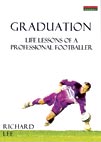 Life lessons of a professional footballer
Life lessons of a professional footballer
by Richard Lee
Bennion Kearney, £9.99
Reviewed by Terry Staunton
From WSC 303 May 2012
Times are tough during an economic downturn and unless you are one of the elite it is no different for footballers. At the end of the 2009-10 season, after a decade at Watford where he increasingly found himself warming the bench, goalkeeper Richard Lee felt it was time for a change, even if it meant dropping down a division and taking home a slimmer pay packet.
He was desperate for more first-team action, before he vanished completely from prospective employers' radars at the age of 27. "I was getting into a dangerous situation, disappearing game-by-game into the goalkeeping black hole." A move to Brentford seemed promising at first, but he was dropped after his debut and soon found himself fourth in the pecking order, behind loan signings.
What follows is an extraordinary and life-affirming story of a single season. Lee, who by his own admission has suffered from acute mental anxiety throughout his career, including panic attacks minutes before kick-off, sought to conquer his inner demons and prove his worth on the pitch. Graduation, therefore, is not so much a run-of-the-mill footballing diary as it is an inspiring self-help tome.
The key to the turnaround in Lee's fortunes was his discovery of neuro-linguistic programming, an approach to communication and psychotherapy pioneered in the 1970s to help sufferers address phobias, depression and psychosomatic illnesses. It is easy to be cynical about any kind of perceived "psychobabble", but Lee embraced the concepts, read dozens of books on the subject, attended seminars and even earned himself a qualification, for what it's worth.
His quick wit and self-effacing humour throughout the book are at odds with the stereotypical image of someone seeking answers through methodologies the more respected end of the medical profession may frown upon. "Surely doing something you love shouldn't make you feel physically sick for 50 days each year," he says in the introduction. It seems that neuro-linguistic programming guided him to a solution.
Reading between the lines, it is clear that Lee was not in need of any kind of wholesale miracle cure. Rather, he needed something to help him organise his fears, identify the genuine ones and dismiss the imagined, leaving him to focus more confidently on the future. He has been driven to succeed in other walks of life, even securing a £150,000 investment for a hat business during an appearance on Dragons' Den, although the deal ultimately fell through after the cameras stopped filming.
As the 2010-11 campaign progresses, Lee applies what he has learned and fights to win back his position between the sticks, becoming the club vice-captain and a fan favourite in the process (the same fans who mocked him when he first arrived at Griffin Park). Promotion never came, but a memorable early-season Carling Cup win over Everton on penalties was vindication enough that whatever he was doing was working for him.
"The season itself will be considered relatively mediocre by many a Brentford fan," he concedes, "but for me it changed my life."